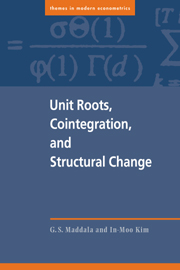Book contents
- Frontmatter
- Contents
- Figures
- Tables
- Dedication
- Preface
- Part I Introduction and basic concepts
- Part II Unit roots and cointegration
- Part III Extensions of the basic model
- 8 The Bayesian analysis of stochastic trends
- 9 Fractional unit roots and fractional cointegration
- 10 Small sample inference: bootstrap methods
- 11 Cointegrated systems with I(2) variables
- 12 Seasonal unit roots and seasonal cointegration
- Part IV Structural change
- Appendix 1 A brief guide to asymptotic theory
- Author index
- Subject index
9 - Fractional unit roots and fractional cointegration
Published online by Cambridge University Press: 04 August 2010
- Frontmatter
- Contents
- Figures
- Tables
- Dedication
- Preface
- Part I Introduction and basic concepts
- Part II Unit roots and cointegration
- Part III Extensions of the basic model
- 8 The Bayesian analysis of stochastic trends
- 9 Fractional unit roots and fractional cointegration
- 10 Small sample inference: bootstrap methods
- 11 Cointegrated systems with I(2) variables
- 12 Seasonal unit roots and seasonal cointegration
- Part IV Structural change
- Appendix 1 A brief guide to asymptotic theory
- Author index
- Subject index
Summary
In the preceding chapters we assumed that the time series is I(d) with d being 0 or 1 or some greater integer. The model with d = 1 corresponds to a model with persistence of shocks. However, persistence or long memory can also be modeled with d > 0 but < 1. The introduction of autoregressive fractionally integrated moving average (ARFIMA) model by Granger and Joyeux (1980) and Hosking (1981) allows us to replace the discrete choice of unit root versus no unit root with a continuous parameter estimate of the long memory component of time series. Likewise, if two series yt and xt are I(d), they are said to cointegrated if yt + βxt is I(b) with b < d, and we allow integer values for b and d. Typically d = 1 and b = 0. In the case of fractional cointegration, suppose that yt and xt are both I(d) and yt + βxt is I(b) with b < d. If b = 0, then the long memory components in yt and xt are common and we say that yt and xt are fractionally cointegrated. If b > 0, then yt + βxt has a long memory component left in it.
In this chapter we shall discuss the issues related to these problems. The paper by Granger (1980) gives a motivation behind the I(d) process. Granger shows that the sum of a large number of stationary AR(1) processes with random parameters can result in a process with long memory. Thus it makes sense to consider I(d) processes while analyzing aggregate date.
- Type
- Chapter
- Information
- Unit Roots, Cointegration, and Structural Change , pp. 296 - 308Publisher: Cambridge University PressPrint publication year: 1999

